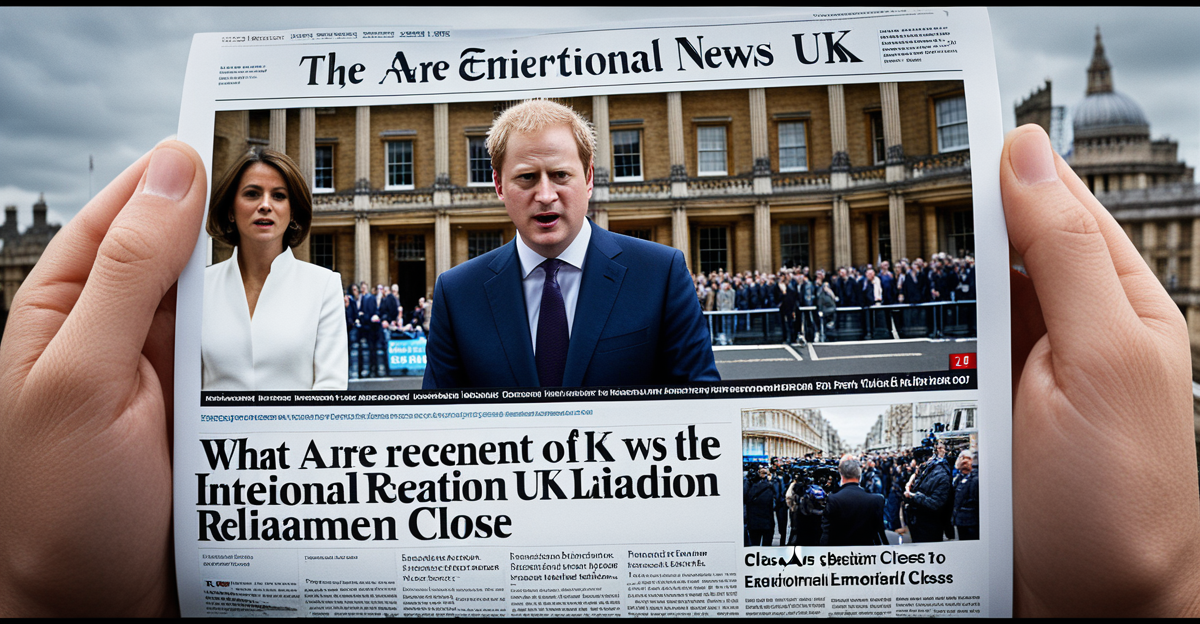Summary of Recent UK News Impacting International Relations
Recent UK news developments have notably influenced international relations, reshaping diplomatic and political landscapes. A key event driving this dynamic was the UK’s announcement of revised immigration policies, which immediately caught the attention of global stakeholders. These changes have triggered both concern and cautious optimism worldwide, particularly in countries with strong migration ties to the UK.
Another significant news item involved the UK’s engagement in climate change commitments, reaffirming its role on the international stage. This move has bolstered relationships with environmentally focused nations and international bodies.
In parallel : What are the effects of digital transformation on UK industries?
The news impact extends to security cooperation. For example, the UK’s updated stance on cybersecurity collaboration has led to shifts in multinational efforts, intensifying partnerships with allies while prompting recalibrations by others.
In summary, UK recent news continues to affect diplomatic conversations and strategic alliances, as international actors react by adapting policies and reassessing their priorities amid evolving geopolitical contexts. The news impact is multi-layered, underscoring the UK’s influence on global affairs through its domestic decisions and international commitments.
Have you seen this : Is the British Monarchy Losing Its Relevance in Today’s Society?
Diplomatic Shifts and Responses
Diplomatic ties have undergone notable realignments following recent developments in UK diplomacy and foreign policy. Countries directly affected by UK recent news have issued official statements signaling a range of reactions, from cautious acceptance to strategic recalibration. For instance, some nations have publicly reaffirmed bilateral relations, emphasizing continued cooperation despite emerging challenges.
Foreign governments are not merely observing; several have enacted immediate policy adjustments to align with the shifting landscape in UK diplomacy. These actions include revising visa protocols, reevaluating joint cybersecurity measures, and enhancing communication channels to ensure mutual understanding.
Multilateral cooperation has seen both strengthening and strain. In some cases, alliances such as NATO have deepened coordination efforts in response to shared security concerns highlighted by the UK’s evolving stance. Conversely, certain international partners are reconsidering their alignment, reflecting the complex news impact on diplomatic networks.
These shifts emphasize how UK diplomacy influences foreign policy decisions globally, prompting tangible responses that reshape the contours of international engagement. As the situation unfolds, diplomatic recalibrations continue to mirror the nuanced effects of the news impact on global political dynamics.
Economic and Trade Implications for International Partners
Recent UK economic news has had a pronounced economic impact on international trade dynamics. Shifts in UK trade policy, including adjustments to tariff regimes and customs procedures, have prompted partner countries to reassess existing agreements and supply chain strategies. These measures directly influence market access and cost structures for exporters and importers alike.
Investor confidence has shown volatility following this UK recent news, reflected in fluctuating stock markets and revised economic forecasts. For example, some financial analysts highlight increased uncertainty in sectors like automotive and agriculture, where UK trade policies significantly affect cross-border transactions. This uncertainty often leads to cautious investment approaches among international stakeholders.
Specific industries have experienced concrete repercussions. The manufacturing sector in the EU, heavily intertwined with UK supply chains, has reported disruptions and increased costs, while financial services face challenges adapting to evolving regulatory environments. Such case studies underscore the broad scope of the news impact.
Together, these developments reveal how UK economic news extends beyond domestic borders, reshaping trade relations and economic outlooks across multiple continents. Understanding these trends is crucial for global partners navigating the changing landscape of international commerce.
Political Analysis and Expert Commentary
Experts widely agree that recent UK politics shifts carry significant policy implications for both domestic governance and international alliances. Political scientists emphasize that evolving UK policy positions may recalibrate longstanding alliances, particularly within the EU and NATO frameworks. For example, analysts interpret the UK’s stronger immigration stance as a signal of prioritized sovereignty, which could reverberate through diplomatic engagements.
Think tanks point to potential long-term consequences, such as the restructuring of strategic partnerships and the redefinition of the UK’s global role. These assessments highlight nuanced divergences: some view UK policies as assertive steps toward regaining control, while others caution about possible isolation or economic repercussions.
Foreign diplomats and commentators often contrast UK intentions with regional integration trends, suggesting that the news impact might prompt other countries to adjust their own policies. This dynamic underscores an ongoing dialogue between UK politics and international stakeholders, where expert analysis helps decode complex developments and forecasts emerging trajectories in global politics.
Implications for Global Organizations and Alliances
Recent UK policy impact has significantly influenced the UK’s role within major international organizations and alliances. Notably, its evolving stance has prompted recalibrations in bodies such as the United Nations, NATO, and the European Union. For instance, the UK’s revised immigration and cybersecurity policies have necessitated adjustments in joint initiatives, reflecting an adaptation to shifting priorities within these organizations.
Member states have responded by renegotiating cooperation terms to maintain effective collaboration, highlighting the news impact on multilateral commitments. In NATO, the UK’s intensified security focus has reinforced alliance readiness but also encouraged some partners to reconsider resource contributions and operational strategies.
Simultaneously, within the EU, the UK policy impact has stirred discussions on the future shape of economic and political ties, influencing collective decision-making processes. These developments underscore a pattern: the UK’s recent news is a catalyst for both strengthened alliances and emerging tensions, depending on the context.
Overall, the interplay between UK policy changes and the responses of international organizations illustrates the dynamic nature of diplomacy and cooperation in a complex global environment. Understanding these shifts helps clarify the broader geopolitical dialogue shaping contemporary alliances.
